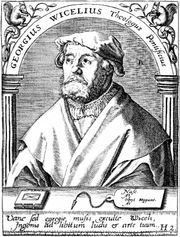
Georg Witzel
Encyclopedia

Vacha, Germany
Vacha is a town in the Wartburgkreis district, in Thuringia, Germany. It is situated on the river Werra, 15 km west of Bad Salzungen, and 23 km east of Bad Hersfeld....
, Province of Hesse
Hesse
Hesse or Hessia is both a cultural region of Germany and the name of an individual German state.* The cultural region of Hesse includes both the State of Hesse and the area known as Rhenish Hesse in the neighbouring Rhineland-Palatinate state...
, 1501; d. at Mainz
Mainz
Mainz under the Holy Roman Empire, and previously was a Roman fort city which commanded the west bank of the Rhine and formed part of the northernmost frontier of the Roman Empire...
, 16 February 1573) was a German theologian.
Life
He received his primary and academic education in the schools of SchmalkaldenSchmalkalden
- Notable people :*Christoph Cellarius, scholar, born 22 November 1638, died 4 June 1707 in Halle*Christian Karl August Ludwig von Massenbach, colonel, born 16 April 1758, died 21 November 1827 at Białokosz...
, Eisenach
Eisenach
Eisenach is a city in Thuringia, Germany. It is situated between the northern foothills of the Thuringian Forest and the Hainich National Park. Its population in 2006 was 43,626.-History:...
, and Halle
Halle, Saxony-Anhalt
Halle is the largest city in the German state of Saxony-Anhalt. It is also called Halle an der Saale in order to distinguish it from the town of Halle in North Rhine-Westphalia...
; spent two years in the University of Erfurt
University of Erfurt
The University of Erfurt is a public university located in Erfurt, Germany. Originally founded in 1379, the university was closed in 1816 for the next 177 years...
, and seven months in the University of Wittenberg. Following the wish of his father he was ordained priest in 1520 and appointed Vicar of Vacha. In 1524, however, the teachings of Martin Luther
Martin Luther
Martin Luther was a German priest, professor of theology and iconic figure of the Protestant Reformation. He strongly disputed the claim that freedom from God's punishment for sin could be purchased with money. He confronted indulgence salesman Johann Tetzel with his Ninety-Five Theses in 1517...
attracted him.
Abandoning the Catholic faith, he married, and the following year was appointed to the pastorate of Wenigenlupnitz by James Strauss
James Strauss
James Dean Strauss is an American theologian who was professor of theology and philosophy at Lincoln Christian Seminary from 1967-1994. He has been described by many as the Einstein of the Restoration Movement.-Life:...
, and a little later to that of Niemeck by Luther himself. He now began a thorough study of the Scriptures and the Church Fathers
Church Fathers
The Church Fathers, Early Church Fathers, Christian Fathers, or Fathers of the Church were early and influential theologians, eminent Christian teachers and great bishops. Their scholarly works were used as a precedent for centuries to come...
, and soon became convinced that the Church of Luther was not the true Church and that Lutheran morals did not make for the betterment of the people. To express his dissatisfaction with the new teaching, he wrote in 1527 two works which he sent to the theologians of Wittenberg without, however, receiving any satisfaction from them.
To give more emphatic expression to his conviction of the error of the new religion, he resigned his charge in 1531 and returned with his family to Vacha. Here he spent two years in extreme poverty. In 1532 he published, under the pseudonym Agricola Phaqus, his Pro defensione bonorum operum, a work which aroused all the bitterness of his enemies. Among his works published at this time his Apologia (Leipzig, 1533) deserves special mention, since in it he gives his reasons for returning to the Church of Rome.
Owing to Witzel's opposition to the doctrinal novelties of the age, he was forced to leave Vacha. He proceeded to Eisleben
Eisleben
Eisleben is a town in Saxony-Anhalt, Germany. It is famous as the hometown of Martin Luther, hence its official name is Lutherstadt Eisleben. As of 2005, Eisleben had a population of 24,552...
, and in 1538 was called to Dresden
Dresden
Dresden is the capital city of the Free State of Saxony in Germany. It is situated in a valley on the River Elbe, near the Czech border. The Dresden conurbation is part of the Saxon Triangle metropolitan area....
. Here he conceived a plan of reunion, which took the form of a public disputation in Leipzig in 1539. He had already (1537) published his Methodus concordiae ecclesiasticae, and for the new disputation he prepared Typus prioris Ecclesiae in which he proposed the Church of the first centuries as the ideal to be sought for. His endeavours for reunion, however, were without result. Opposition forced him to flee to Bohemia
Bohemia
Bohemia is a historical region in central Europe, occupying the western two-thirds of the traditional Czech Lands. It is located in the contemporary Czech Republic with its capital in Prague...
, thence to Berlin
Berlin
Berlin is the capital city of Germany and is one of the 16 states of Germany. With a population of 3.45 million people, Berlin is Germany's largest city. It is the second most populous city proper and the seventh most populous urban area in the European Union...
. The rapid progress of Protestantism soon convinced him that here too his efforts would be fruitless, and he forthwith proceeded to Fulda
Fulda
Fulda is a city in Hesse, Germany; it is located on the river Fulda and is the administrative seat of the Fulda district .- Early Middle Ages :...
, where he directed his efforts towards defending the Church; but in 1554 he was again forced to flee, now to Mainz, where he spent the remainder of his life in literary work and probably as professor at the university of Mainz.

